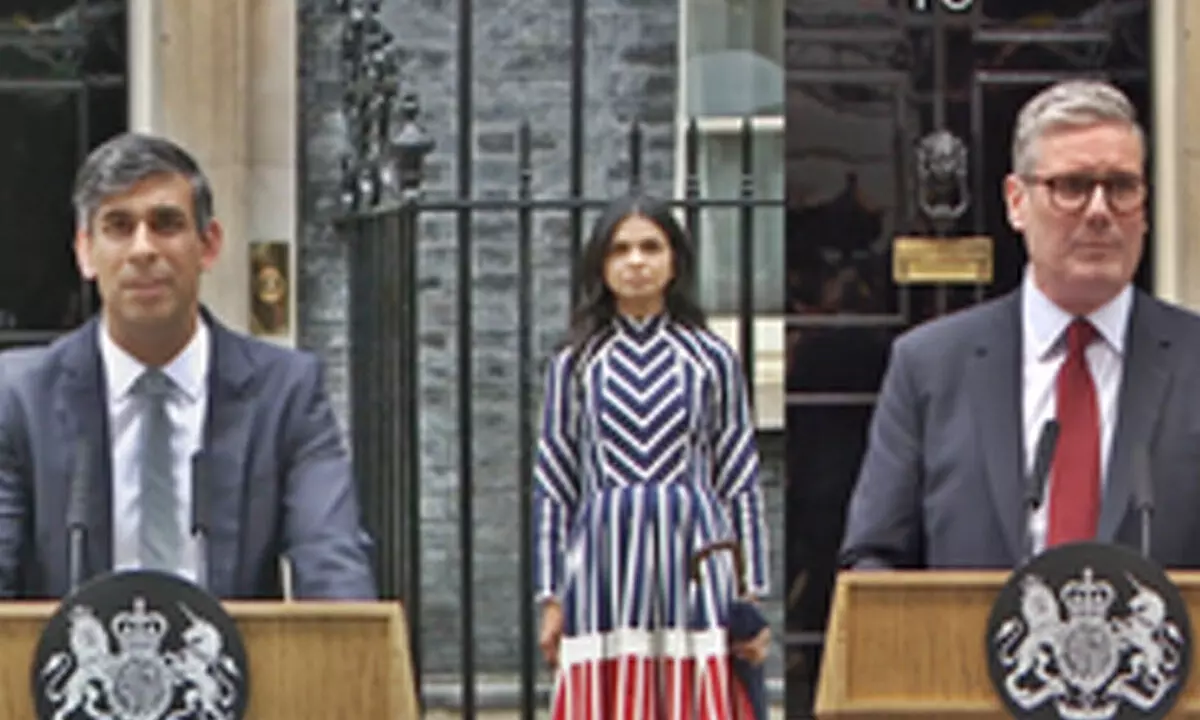Starmer sweeps, Sunak slumps: Five major takeaways from UK elections
Share :

It was a rain-soaked day in late May when PM Rishi Sunak came out of his 10 Downing Street residence to announce elections on July 4, and it was another rainy day on Friday when he came out to concede defeat, with his Conservatives suffering a major hammering to slump to a new parliamentary low - at less than a fifth of the total seats.
New Delhi: It was a rain-soaked day in late May when PM Rishi Sunak came out of his 10 Downing Street residence to announce elections on July 4, and it was another rainy day on Friday when he came out to concede defeat, with his Conservatives suffering a major hammering to slump to a new parliamentary low - at less than a fifth of the total seats.
The crushing defeat for the Conservative Party follows 14 eventful years in power in which they not only led the country out of the European Union, weathered the Covid pandemic, and sought to fashion a new position for the country in the world beyond continental ties, but also suffered a string of controversies, frequent leadership changes - 5 PMs in a decade and a half! - and major internal divisions.
Presiding over a decade or more of economic stagnation and social neglect - since PM David Cameron's austerity programme and the implications of Brexit - also led to the outcome.
Meanwhile, the Labour Party, reeling from a string of defeats after its own 13 years in power and a pronounced leftward slant under Jeremy Corbyn, reformed and revitalised itself under former government law officer, Sir Keir Starmer, to provide a cogent programme and successful outreach.
It won 412 seats - just a shade under the 419 garnered by Tony Blair in 1997 to end 18 years of Conservative rule, but equal to his haul in 2001.
Time will show whether the result was actually a Labour victory or a Conservative defeat, though it must be considered that the loathing for the present dispensation and enthusiasm for the available alternative are not evenly matched.
It also has to be seen how the Labour Party will do in power, but the course and results of the elections throw up certain instructive points - though it is debatable if they are long-term in nature or linked to this particular electoral cycle.
Economic situation and living standards remain overriding public concern
The Conservatives presided over a decade and more of economic morass where not only incomes remained stagnant amid rising inflation, leading to standards of living dipping, but productivity declined too.
Granted the consequences of Covid were challenging for all governments, but Cameron's austerity programme and the lowered social spending it entailed, and then, Brexit were choices. By the time Sunak promised the country was turning the corner, the damage had been done.
Power may (or may not) corrupt but long stints 'blind'
The course of British political history for the past four and a half decades is instructive. Of these 45 years, the Conservatives were in power for 32 years - in two consecutive tranches of 18 years (1979-1997) under Margaret Thatcher and John Major and 14 years (2010-24) under Cameron, Theresa May, Boris Johnson, Liz Truss, and Sunak, against 13 for Labour (1997-2010) under Blair and Gordon Brown.
It is evident that complacency and a disregard for public perception crept in, as admitted by a string of senior Conservative leaders, many who lost their seats, that they had grown distant from the people and failed to respect and respond to the concerns.
Don't ape far-right populists
This is particularly applicable to the Conservatives, which, over the past few years, swung more and more to the right, in a bid to outflank the Brexit Party/Reform UK on issues such as EU membership and immigration, a la Suella Braverman.
It did not provide them appreciable benefits, but damaged them as votes swung to Nigel Farage's Reform Party, which may have got only 4 seats but hit them in scores. Conservatives learnt too late that if you bring a populist party into the limelight by seeking to appropriate its platform, what will prevent people from voting for the real thing itself?
Europe's right-wing turn not a fair accompli
Amid the rightward turn in European politics - the victory of Marine Le-Pen's National Rally in the European Parliament and the French National Assembly's first round, of the AfD in Germany, the True Finns in Finland, and so on - the UK has bucked the trend.
Granted the Labour is more of a centrist party now - in some respects indistinguishable from the Conservatives - under Starmer, but in perception, it is still somewhat left.
British yet to fully support ethnic-minority leader
Winning the leadership contest of the traditional-minded Conservatives on his second attempt - after the implosion of the Liz Truss dispensation - Sunak led the Conservatives to its second major electoral defeat after the recent regional council elections, and announced he is stepping down.
There is a perception, especially among Britons of South Asian descent, that the UK is still not ready for an ethnic minority leader - beyond a certain level.
Humza Yousaf's short-lived stint as Scotland's First Minister is another recent example.










